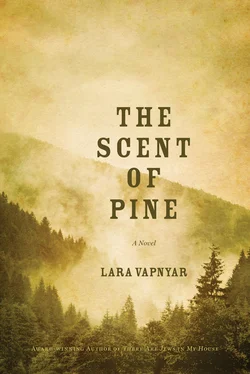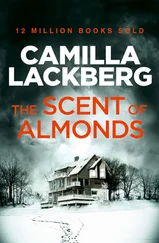When the train pulled close to the stop, the tall girl shut her book and walked up to Lena and introduced herself as Inka. “Your name’s Lena, right?” Lena nodded. They took seats together.
As the train passed through the ugly industrial outskirts of Moscow, Inka admitted to Lena that she hated their school and hated the idea of being a teacher. She confessed she had picked this program because it was reasonably easy to get into, and she really wanted to get out of her hometown and live in Moscow. And Lena told her that she ended up in State Pedagogical—her safety school—because she failed the auditions in the four acting schools to which she’d applied. “Acting?” Inka asked. “But you’re so shy.” Lena explained that acting allowed people to become somebody they were not, even if only for a brief time. She wouldn’t be shy on stage. She said that she wanted to be an actress because she really wanted to live many lives instead of just one. She wanted to see what it was like to murder somebody, or to be murdered, what it was like to be at war, to live in the nineteenth century, to lose a loved one, but she didn’t want the experience to affect the rest of her life. As she spoke, Lena was scared that Inka would laugh at her, but Inka didn’t laugh. Instead, seeing how embarrassed Lena was, she confessed that she composed poems in her sleep. Lena felt a kind of affection blossoming, not because the other girl wrote poems, but because she’d been willing to reveal it to Lena to ease her embarrassment.
Inka had light brown hair streaked with pink and blue. She dressed differently from other girls in their school too—most of the clothes that she wore were imported and obviously expensive, but they seemed to be bought at random, so they didn’t match, and some of them didn’t even fit. On the train Inka said that she’d come to Moscow from a small town and was under the impression that Muscovites existed on a different frequency, which she couldn’t tune in to. That was her excuse for why she couldn’t make friends. Lena couldn’t respond, having been born and raised in Moscow. If she couldn’t make friends, it was only because she sucked at making friends, or simply because she sucked.
As the train got farther from Moscow, Inka asked Lena if she had a boyfriend. Lena shook her head. “Me neither,” Inka said, explaining that she had gone out with plenty of boys, but there hadn’t been anybody to really spark her interest.
Lena was terrified that the next question would be whether she had had sex, so she decided to change the subject.
“What have you got there?” she asked, pointing at the box with books Inka was holding in her lap. Inka opened the top of the crate and showed her.
The Satiricon, The Golden Ass, The Canterbury Tales, The Decameron, The Arabian Nights, and Excerpts from the Bible with the long introduction meant to prove how wrong and silly the Bible was, written by somebody who had a Ph.D. in scientific atheism.
All the books were from the summer list for their Foreign Literature Part 1 class. Lena laughed—she had the same books in her backpack. Plus, she had several issues of Art of Cinema magazine, with the screenplay of Last Tango in Paris in the last one. “Ooh! That’s the one where he—never mind—I’ll have to borrow that!” Inka said.
About two hours into the trip, when the train was passing some bleak countryside, with lopsided barns and skinny cows stuck in mud, they unwrapped and ate omelet sandwiches that Lena’s mother had made for her, and little meat pies that Inka’s mother had baked at home and brought to Moscow on a train, in a big aluminum pot wrapped in a woolen shawl.
Inka said that her mother was only thirty-four years old. She got pregnant with Inka while still in high school and had to marry Inka’s father. Her father was a smart, mean man who had once been an artist but was now just a common drunk. Her mother was a hairdresser and very pretty. Her biggest fear was that Inka would get pregnant and have to get married young too. Inka had to promise her mother that whatever happened she wouldn’t get married before she was twenty-three.
“Why twenty-three?” Lena asked.
Inka didn’t know. She sighed and cleaned a spot on the window with her sleeve. She said that her biggest wish was to escape the pattern. She said that it was the scariest thing—falling into a pattern and knowing what was going to happen to you.
Lena’s parents had gotten divorced when she turned sixteen. The official version was that her mother threw her father out. At first her mother was euphoric, energized, proud of her resolve. She was brimming with plans for her new independent life, but in a month or two she started to fall apart. What horrified Lena the most was her mother’s staggering insecurity. She acquired this strange new expression, this sideways questioning look, as if she suspected that people were laughing at her. But if she told a joke, it was the other way around; she was terrified that people wouldn’t laugh, and she smiled with such gratitude when they did. And even those stupid omelet sandwiches that she’d been proudly making for years: Now she would push the omelet from the pan onto the cutting board and freeze with the knife suspended in her fingers: “Do you even like them? Are they even good? Lena, please tell me the truth, do you like my omelet sandwiches?” Lena couldn’t stand her like that. She couldn’t bear to talk to her, to look at her. She tried to hide from her mother’s unhappiness as if it were an infectious disease. She loathed herself for that, but she couldn’t help it. Her father, on the other hand, seemed to be okay. “I feel as if I were learning to breathe anew,” he’d whispered when Lena saw him last. He rented a tiny room in a shoddy, crowded, roach-infested apartment, but he didn’t seem to mind. He began to wear a look of cautious happiness, as if he’d discovered a treasure and was afraid that someone would take it away. Lena couldn’t bear to see him happy, when she knew how much the divorce pained her mother. She couldn’t bring herself to visit him after that. She cried at night, both hating and missing him.
Lena looked at Inka’s solemn profile, which didn’t go with the mess of pink and blue in her hair, and wondered if she could understand. She looked like she could.
About an hour away from the camp, the scenery changed dramatically. Woods gradually supplanted fields and meadows, and the closer we got to the camp, the denser the woods became. Inka and Lena stopped talking and looked out the window. At one point they thought they saw a moose. The girls in the seat behind them giggled in delight.
“Was it a moose?” one of them asked.
“I think so, I saw a few last year,” another said, launching into stories about her superfun experience at the camp the year before. Fresh air, sunbathing, good food, plenty of free time. Not only that, but the camp belonged to the Ministry of Defense, so many, many guys worked there. Officers. Soldiers drafted into the Soviet Army from college. Some were even seriously smart. She gushed about discothèques under a starry sky, the riverbank where you could take romantic walks, and the touchingly beautiful clearings in the woods where the grass was tall and silky-soft under your back.
Inka and Lena exchanged glances and smiled. Inka said that she had thought she’d fall in love when she started college. “It’s been eight months—and nothing. Eight months!” Her face tensed with panic. Lena knew exactly how she felt. She told Inka that she had been playing the “boyfriend game” for several years herself. Every time she was about to reach a certain milestone—turn fifteen, sixteen, enter high school, college—she thought, “Now!” And nothing happened. Every time she was going to someplace new—on vacation, on a long train trip, to a party, to a museum—she thought, “There!” And nothing. She would meet a boy from time to time, and he would ask her out, and she would feel a surge of excitement, but the excitement would evaporate pretty soon—usually before the date ended.
Читать дальше












